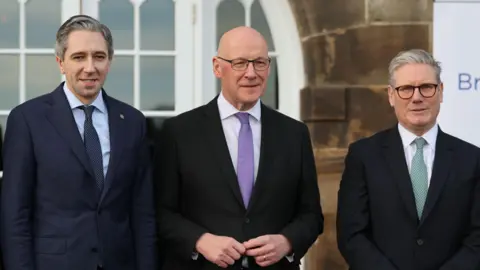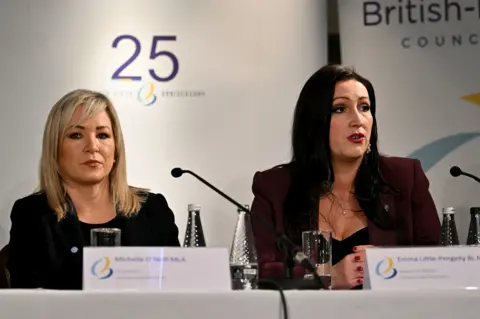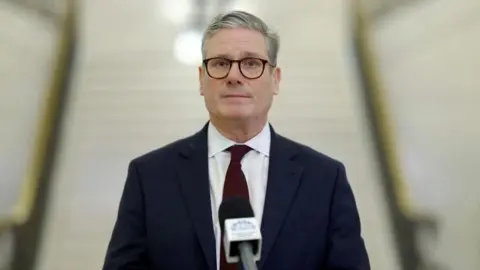Harris 'hopes' to end Legacy Act legal challenge
 ROBERT PERRY/POOL/EPA-EFE/REX/Shutterstock
ROBERT PERRY/POOL/EPA-EFE/REX/ShutterstockThe outgoing Taoiseach (Irish prime minister) has said he hopes the Irish government can drop its legal action against the UK government over the Troubles Legacy Act.
Simon Harris was speaking after he met Prime Minister Sir Keir Starmer and other leaders of UK jurisdictions at the British-Irish Council (BIC) summit in Scotland.
Northern Ireland's First and Deputy First Ministers, Michelle O'Neill and Emma Little-Pengelly were also there, as were the first ministers of Scotland and Wales.
The UK government has already begun the process off repealing the controversial legislation which had prevented many Trouble-related cases going to court.
Repeal of Legacy Act
Disputes over Brexit and the Troubles Legacy Act left UK/Irish relations at their lowest ebb for decades during the final days of the Conservative administration.
But the return of a Labour government has led to a much-vaunted reset.
Just this week, the Northern Ireland Secretary, Hilary Benn, began the repeal of the Legacy Act which the Irish government is challenging under the European Convention on Human Rights (ECHR).
The act, which was brought in by the Conservative government, introduced a ban on fresh Troubles-era inquests and civil actions.
It also sought to offer a conditional amnesty for people suspected of Troubles-related crimes in exchange for co-operating with a new information recovery body.
Speaking on Friday, Harris welcomed the move this week to repeal the act but added that "it's important we get this right".
"The legal action still remains but I hope we can get to the position where it doesn't need to remain," he said.
 PA Media
PA MediaSir Keir is only the third prime minister to attend a meeting of the British-Irish Council in 17 years.
Harris and Tánaiste (Irish deputy prime minister) Micheál Martin attended the event just a week after a general election which has paved the way for another Fianna Fáil/Fine Gael coalition government.
Speaking on Friday afternoon, Northern Ireland's First Minister Michelle O'Neill said the council demonstrated the "the importance of relationships across these islands".
"It is very important that those who are the guarantors of the Good Friday Agreement… understand the position that they hold because whenever Dublin and London diverges, the north always gets squeezed," she said.
The latest meeting of the council, the first minster added, was an opportunity to "reset" after the "tenure of the Tories".
Emma Little-Pengelly said there were areas of common concern among the political leaders.
"There is no doubt that right throughout the United Kingdom and indeed these isles we face very similar challenges," she said.
The deputy first minster had raised farmers concerns about changes to agricultural relief and the impact of national insurance rises among employers with the British government, she said.
"The key test for this government will be will they listen to us?" Little-Pengelly added.
 Reuters
ReutersThis is the 42nd summit of the BIC, one of the bodies which emerged from the Good Friday Agreement.
Downing Street said the prime minister is focused on delivering what matters to people right across the UK and working closely with the devolved institutions, including Stormont.
Analysis: 'Envy of a parliamentary majority'
Sir Keir Starmer has met Micheál Martin and Simon Harris before.
But the timing of this meeting is interesting, coming just a week after the Irish general election.
Oh, how enviously the Fianna Fáil and Fine Gael leaders must view his parliamentary majority, which currently stands at 156.
They are currently two short of one, and Martin says it will be after Christmas before a coalition government is formed.
Often past meetings of the British-Irish Council have been overshadowed by stalemate at Stormont.
Not this time.
The First and Deputy First Ministers, Michelle O'Neill and Emma Little-Pengelly have now been in place longer than their Scottish and Welsh counterparts, after upheaval in Edinburgh and Cardiff, while Sir Keir only got his hands on power in July.
